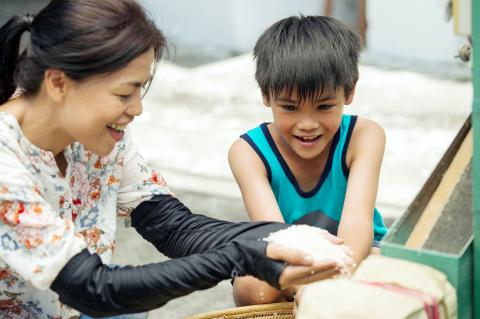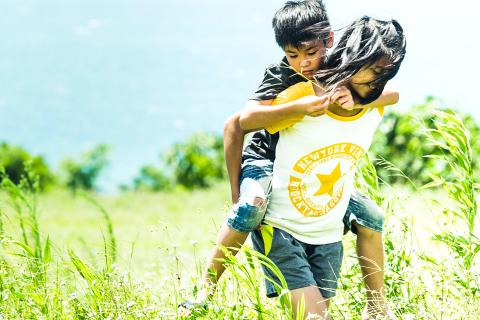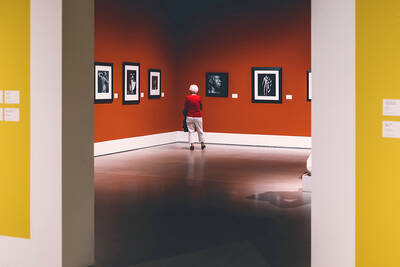The film Wawa No Cidal tells the story of Hualien Aborigines reviving their terraced fields. Although few people have had such an experience, the film resonates with the audience. It gives an honest account of situations that Taiwanese share, and, without yelling about it or being excessively tragic, it softly displays the power of tenderness.
Director Lekal Sumi grew up in Tainan. After completing his military service, he went to Hualien to be with his mother, only to discover the utter strangeness that he felt toward his hometown. Although he had no professional training in filmmaking, he attempted to pull his hometown closer to himself through his camera lenses and made a documentary, Wish of the Ocean Rice, which recorded how his mother revived the terraced fields. Moved by what he saw, director Cheng Yu-chieh invited Sumi to work with him on making the feature film Wawa No Cidal, which is based on the documentary.
Wawa No Cidal begs the question, “When the land is gone, when the home is gone, where will we be?” By helping people relate to other people’s experience through films, Cheng tries to make his audience understand the meaning of land from Aboriginal people’s perspective. “How much does one ping of land cost?” is usually the question that non-Aboriginal Taiwanese ask when it comes to land. Aborigines, however, do not think that land belongs to people, but rather see it as a resource that humans borrow from nature. Mountains, oceans, or humans, all are wawa no cidal — children of the sun.

Photo provided by Activator Marketing Company
電影劇照由牽猴子提供
In the film, leading actress Ado’ Kalitaing Pacidal mentions her childhood experience of joining speech contests, in which she had to make an effort to conceal her Aboriginal accent and speak like a Han Chinese. Sumi says this is a common experience shared by all Aborigines who try to survive in the cities. Cheng says, “As a matter of fact, the whole country is in the business of pretending. For instance, some Taiwanese try to mute their Taiwanese accent when they visit China. Why is it so hard to be yourself? It tells us that we are still very far from being a multicultural society.”
Sumi also comments, “Taiwan could obviously be very multicultural, but every city wants to turn itself into another Taipei. If you do not make so many thousand, you are a nobody, but actually, without life, there is no culture.”
(Liberty Times, translated by Ethan Zhan)

Photo provided by Activator Marketing Company
電影劇照由牽猴子提供
電影《太陽的孩子》講述花蓮原住民復育梯田的故事,乍看很遙遠,卻引發強大的共鳴。它誠實說出台灣人共同的處境,不吶喊、不悲情,自然展現出「有一種力量叫溫柔」。
導演勒嘎‧舒米在台南長大,退伍後回到花蓮陪媽媽,突然發現故鄉這麼陌生。他雖不是電影科班,但仍想要透過鏡頭拉近與故鄉的距離,把母親復育梯田的過程拍成紀錄片《海稻米的願望》。導演鄭有傑看後深受感動,便找勒嘎一起改拍成劇情片《太陽的孩子》。
《太陽的孩子》質問「土地沒了,家也沒了,我們要到哪裡去?」鄭有傑想要藉由電影連結人與人的同理心,讓大家瞭解土地對原住民的意義。不像漢人一聽到土地就問:「一坪多少錢?」原住民不認為土地屬於人,人只是跟大自然借用資源。不管是山、海、還是人,一樣都是「太陽的孩子」。
女主角阿洛.卡力亭.巴奇辣在片中提到小時候參加演講比賽,必須努力隱藏原住民口音,模仿漢人。勒嘎說這是所有原住民在都市求生的共同經驗。鄭有傑說:「其實我們整個國家都在演戲,例如有些台灣人去中國,也會去掉台灣腔。為何我們要做自己這麼困難?這表示我們離多元文化還非常遙遠。」
勒嘎也說:「台灣明明可以很多元,但卻都想要變成台北,好像沒有幾K就不是人,但其實沒了生活,就沒有文化。」
(記者鄒念祖專訪)

After the death of Pope Francis on April 21, the Vatican’s papal conclave on May 8 elected a new leader for the Catholic Church. Chicago-born Robert Francis Prevost, who chose to be called Leo XIV, became the 267th pope, spiritual leader of the world’s 1.4 billion Catholics. But what exactly does a pope do? Here is a rundown of his main responsibilities. CATHOLIC LEADER The word pope comes from the Greek “pappas,” meaning “father, patriarch,” which is why believers call him the Holy Father. He is considered the successor of St Peter, to whom Jesus Christ is said to have entrusted

If you could nominate any toys for the Toy Hall of Fame, what would they be? Iconic playthings like yo-yos, toy cars, or video games seem like obvious __1__. Classic toys such as jacks, playing cards, and board games like Chess, Monopoly, and Uno have brought endless joy to generations. Overall, there are countless toys that __2__ in the Toy Hall of Fame. The National Toy Hall of Fame was __3__ in 1998 at The Strong National Museum of Play in Rochester, New York. The Toy Hall of Fame aims to __4__ items that have been cherished for generations, and several

Have you ever wondered who decides what we see in a museum or how one artwork seamlessly connects to the next? Behind every thoughtfully arranged gallery space stands a curator, a skilled professional who combines art and storytelling to craft meaningful experiences. The term “curator” originates from the Latin word cura, meaning “to care.” Curators were originally caretakers of museum collections, but over time, their role has grown to include a broad range of responsibilities that extend far beyond preservation. Today, curators manage, organize and interpret collections in cultural institutions like museums and libraries. They research, acquire and catalogue

Continued from yesterday(延續自昨日) https://www.taipeitimes.com/News/lang However, not every toy has its moment. Some fans were __8__ that simple classics like balloons—a universal symbol of celebrations—haven’t made the cut yet. With their lightweight charms and transformative puffs of air, balloons have __9__ millions for decades and will have to wait at least another year for a chance to be inducted. As the Toy Hall of Fame continues to celebrate toys that __10__ creativity and joy, we can only wonder which treasures will earn a spot next. Will the widely adored balloon finally take its place in 2025? Only time will tell, but one thing is